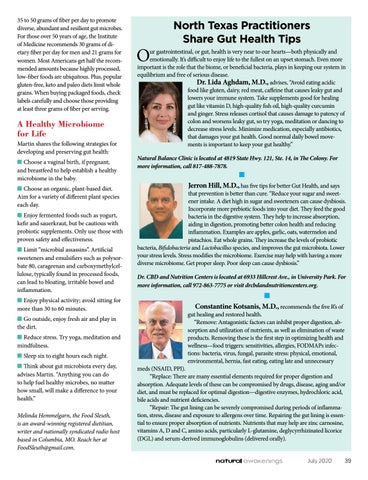35 to 50 grams of fiber per day to promote diverse, abundant and resilient gut microbes. For those over 50 years of age, the Institute of Medicine recommends 30 grams of dietary fiber per day for men and 21 grams for women. Most Americans get half the recommended amounts because highly processed, low-fiber foods are ubiquitous. Plus, popular gluten-free, keto and paleo diets limit whole grains. When buying packaged foods, check labels carefully and choose those providing at least three grams of fiber per serving.
A Healthy Microbiome for Life Martin shares the following strategies for developing and preserving gut health: n Choose a vaginal birth, if pregnant; and breastfeed to help establish a healthy microbiome in the baby. n Choose an organic, plant-based diet. Aim for a variety of different plant species each day. n Enjoy fermented foods such as yogurt, kefir and sauerkraut, but be cautious with probiotic supplements. Only use those with proven safety and effectiveness. n Limit “microbial assassins”. Artificial sweeteners and emulsifiers such as polysorbate 80, carageenan and carboxymethylcellulose, typically found in processed foods, can lead to bloating, irritable bowel and inflammation. n Enjoy physical activity; avoid sitting for more than 30 to 60 minutes. n Go outside, enjoy fresh air and play in the dirt. n Reduce stress. Try yoga, meditation and mindfulness. n Sleep six to eight hours each night. n Think about gut microbiota every day, advises Martin. “Anything you can do to help fuel healthy microbes, no matter how small, will make a difference to your health.” Melinda Hemmelgarn, the Food Sleuth, is an award-winning registered dietitian, writer and nationally syndicated radio host based in Columbia, MO. Reach her at FoodSleuth@gmail.com.
O
North Texas Practitioners Share Gut Health Tips
ur gastrointestinal, or gut, health is very near to our hearts—both physically and emotionally. It’s difficult to enjoy life to the fullest on an upset stomach. Even more important is the role that the biome, or beneficial bacteria, plays in keeping our system in equilibrium and free of serious disease. Dr. Lida Aghdam, M.D., advises, “Avoid eating acidic food like gluten, dairy, red meat, caffeine that causes leaky gut and lowers your immune system. Take supplements good for healing gut like vitamin D, high-quality fish oil, high-quality curcumin and ginger. Stress releases cortisol that causes damage to patency of colon and worsens leaky gut, so try yoga, meditation or dancing to decrease stress levels. Minimize medication, especially antibiotics, that damages your gut health. Good normal daily bowel movements is important to keep your gut healthy.”
Natural Balance Clinic is located at 4819 State Hwy. 121, Ste. 14, in The Colony. For more information, call 817-488-7878.
n Jerron Hill, M.D., has five tips for better Gut Health, and says
that prevention is better than cure. “Reduce your sugar and sweetener intake. A diet high in sugar and sweeteners can cause dysbiosis. Incorporate more prebiotic foods into your diet. They feed the good bacteria in the digestive system. They help to increase absorption, aiding in digestion, promoting better colon health and reducing inflammation. Examples are apples, garlic, oats, watermelon and pistachios. Eat whole grains. They increase the levels of probiotic bacteria, Bifidobacteria and Lactobacillus species, and improves the gut microbiota. Lower your stress levels. Stress modifies the microbiome. Exercise may help with having a more diverse microbiome. Get proper sleep. Poor sleep can cause dysbiosis.” Dr. CBD and Nutrition Centers is located at 6933 Hillcrest Ave., in University Park. For more information, call 972-863-7775 or visit drcbdandnutritioncenters.org.
n Constantine Kotsanis, M.D., recommends the five R’s of
gut healing and restored health. “Remove: Antagonistic factors can inhibit proper digestion, absorption and utilization of nutrients, as well as elimination of waste products. Removing these is the first step in optimizing health and wellness—food triggers: sensitivities, allergies, FODMAPs infections: bacteria, virus, fungal, parasite stress: physical, emotional, environmental, hernia, fast eating, eating late and unnecessary
meds (NSAID, PPI). “Replace: There are many essential elements required for proper digestion and absorption. Adequate levels of these can be compromised by drugs, disease, aging and/or diet, and must be replaced for optimal digestion—digestive enzymes, hydrochloric acid, bile acids and nutrient deficiencies. “Repair: The gut lining can be severely compromised during periods of inflammation, stress, disease and exposure to allergens over time. Repairing the gut lining is essential to ensure proper absorption of nutrients. Nutrients that may help are zinc carnosine, vitamins A, D and C, amino acids, particularly L-glutamine, deglycyrrhizinated licorice (DGL) and serum-derived immunoglobulins (delivered orally). July 2020
39






